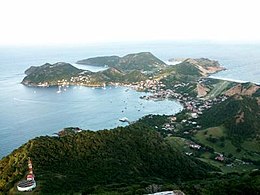Terre-de-Haut Island
| Native name: Terre-de-Haut des Saintes | |
|---|---|

Terre-de-Haut view from Chameau hill.
|
|
 |
|
| Geography | |
| Location | Caribbean sea |
| Coordinates | 15°51′45″N 61°35′00″W / 15.86250°N 61.58333°WCoordinates: 15°51′45″N 61°35′00″W / 15.86250°N 61.58333°W |
| Archipelago | Îles des Saintes |
| Total islands | 9 |
| Major islands | Terre-de-Bas Island |
| Area | 5.2 km2 (2.0 sq mi) |
| Highest elevation | 306 m (1,004 ft) |
| Highest point | Chameau hill |
| Administration | |
| Overseas department | Guadeloupe |
| Canton | les Saintes |
| commune | Terre-de-Haut |
| Capital city | Fond-du-Curé |
| Largest settlement | Fond-du-Curé |
| Mayor | Louis Molinié |
| Demographics | |
| Population | 1838 (2006) |
| Pop. density | 352 /km2 (912 /sq mi) |
Terre-de-Haut Island (officially in French :Terre-de-Haut des Saintes (literally: highland of les Saintes)) is an island in the Îles des Saintes archipelago, in the Lesser Antilles. It belongs to the commune (municipality) of Terre-de-Haut into the French department of Guadeloupe.
Terre-de-Haut island is the most easterly island of the archipelago of les Saintes. Like its neighbour Terre-de-Bas, it holds its name from the maritime vocabulary which called the islands exposed to the wind highland and those protected from the wind, lowlands. It is an island of 5.2 km2 (2.0 sq mi) dominated in the north by Morne Mire hill (107 metres (351 ft)) and Morel hill (136 metres (446 ft)) and in the South by Chameau hill 306 metres (1,004 ft), the highest mount of the island and the entire archipelago. Terre-de-Haut is separated from Terre-de-Bas by a narrow channel of 890 m (0.55 mi). Besides Terre-de-Bas, several small islands surround Terre-de-Haut:
The Pain de sucre peninsula, with the height of (53 metres (174 ft)) is linked to Terre-de-Haut by an isthmus.
Small villages are seen spread out in the rolling hills in the interior. Fond-du-Curé is located in a natural harbour. Yachts and cruise boats are a common sight in the harbour. The oldest settlements still remaining are the villages of Mouillage and Fond-du curé. The population is spread among 20 quartiers (districts), more or less well delimited. They are grouped into two halves:
The local vocabulary says: "to go up" to move towards the windward quartier (to Fort Napoléon) and "to go down" to move towards the leeward quartier (to Pain-de-sucre).
The inhospitable relief and the low precipitation do not allow the establishment of agriculture. Few slaves were brought onto these islands. The population is constituted historically by Bretons, Normans and by inhabitants of Poitou who settled down to fish. This explains the European type of the people from les Saintes (Saintois) French: [sɛ̃twa] (French gentilic of the inhabitants of les Saintes).
...
Wikipedia
